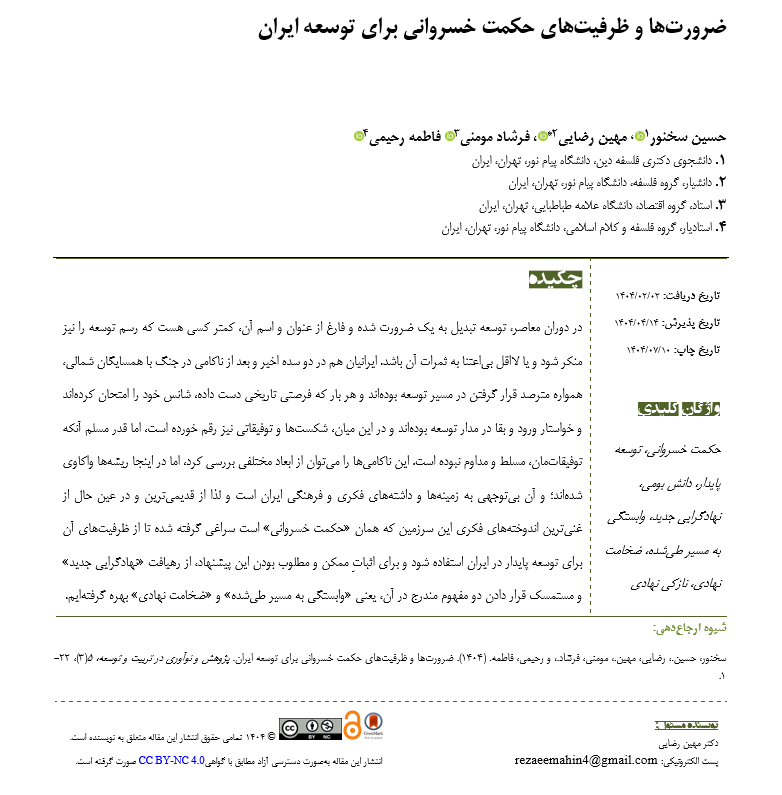The Necessities and Capacities of Khosravani Wisdom for Iran’s Development
Keywords:
Indigenous Knowledge, Institutional Thickness, Institutional Thinness, Khosravani Wisdom, New Institutionalism, Sustainable Development, Path DependencyAbstract
In the contemporary era, development has become an undeniable necessity. Regardless of its label or designation, few deny the principle of development or remain indifferent to its benefits. Over the past two centuries, Iranians—particularly following their defeat in wars with northern neighbors—have persistently sought to embark on the path of development. Whenever a historical opportunity arose, they seized the moment to try their chances, striving for inclusion and continuity within the trajectory of development. These efforts have led to both failures and successes; however, it is evident that our achievements have neither been dominant nor sustained. These shortcomings can be examined from various dimensions, but the present study investigates their roots—particularly the neglect of Iran's intellectual and cultural foundations. In this context, attention is directed toward one of the oldest and richest intellectual heritages of this land: Khosravani Wisdom. The study explores the potential of this tradition for sustainable development in Iran. To demonstrate both the plausibility and desirability of this proposal, the research draws on the approach of New Institutionalism, utilizing two of its core concepts: path dependence and institutional thickness.
Downloads
References
Gorjestani N. Indigenous knowledge for development: Protecting and promoting traditional knowledge: Systems, national experiences and international dimensions; 2004. 265 p.
Gope L, Behera SK, Roy R. Identification of Indigenous Knowledge Components for Sustainable Development among the Santhal Community. American Journal of Educational Research. 2017;5(8):887-93. doi: 10.12691/education-5-8-8.
Corbin H. Islam in the Land of Iran: Suhrawardi and Iranian Platonists: Iranian Institute of Philosophy and Wisdom Research; 2012.
Razi H, Soroush A. Khosrowani Wisdom (Illuminationist Philosophy and Mysticism from Zoroaster to Suhrawardi) Learning from History: Behjat Publications; 2019. 15-20LA - Persian p.
Ebrahimi Dinani G. Khosrowani Wisdom: Vaya Publications; 2016.
Tabatabai SJ. Nation, State, and Rule of Law (Essays on Text and Tradition): Minuye Kherad Publications; 2022.
North DC. Institutions, Institutional Change, and Economic Performance: Organization for Management and Planning Publications; 2006.
North DC. Understanding the Process of Economic Change: Nehadgara Publishing; 2019.
Stuteville R, Tan TDH, editors. The Role of Path-dependency in Public Administration and Economics and Implications for the Future The Heritage of Surhawardi's wisdom of Illumination (Hikmat-Al Ishraq)2010.
Foxon TJ. Technological lock-in and the role of innovation. Handbook of sustainable development: Edward Elgar Publishing; 2014. p. 304-16.
Martin R, Simmie J. Path dependence and local innovation systems in city-regions. Innovation. 2008;10(2-3):183-96. doi: 10.5172/impp.453.10.2-3.183.
Sowell T. Economic Truths and Falsehoods: Ettelaat Publications; 2013.
North D, Wallis J, Weingast B. In the Shadow of Violence: Politics, Economics, and Development Issues: Rozaneh Publications; 2017.
Amin A, Thrift N. 'Living in the global'. In: Oxford University P, editor. Globalization, Institutions and Regional Development in Europe1994.
Weber I. How China Escaped Shock Therapy: Market Reform Debates: Nehadgara Publishing; 2023.
Azimi M. An Institutional Explanation of Regional Imbalances in Iran. Quarterly Journal of Urban and Regional Development Planning. 2016;1(3):139-66.
Eslami Nodoushan MA. What Does Iran Have to Say?: Sherkat Sahami Enteshar; 2020.
Andrews M, Pritchett L, Woolcock M. Empowering Governments: Evidence, Analysis, and Action: Rozaneh Publications; 2019.
Rezagholi A. An Introduction to Localizing Modern Sciences.
Davari Ardakani R. Us and the History of Islamic Philosophy: Organization for Publications of the Research Institute for Culture and Islamic Thought; 2010.
Ruggerio CA. Sustainability and sustainable development: A review of principles and definitions. Science of the Total Environment. 2021;786:147481. doi: 10.1016/j.scitotenv.2021.147481.
Wiktor-Mach D. What role for culture in the age of sustainable development? UNESCO's advocacy in the 2030 Agenda negotiations. International Journal of Cultural Policy. 2020;26(3):312-27. doi: 10.1080/10286632.2018.1534841.
Finnemore M, Sikkink K. International Norm Dynamics and Political Change. International Organization. 1998;52(4):887-917. doi: 10.1162/002081898550789.
Razavi MA. Suhrawardi and the school of illumination: Curzon; 1997.
Babayi A. The Concept of 'Eternal Substance' and the Question of 'Revival or Establishment?' in Suhrawardi's Illuminationist Philosophy. History of Philosophy. 2019;10(3):45-66.
Pazouki S, Zare Z. Khosrowani and Pythagorean Wisdom from the Perspective of Sheikh Suhrawardi. Journal of Mysticism Research. 2017;8(16):1-25.
Suhrawardi YiH. The Works of Sheikh Suhrawardi: Research Institute for Humanities and Cultural Studies; 2001.
Rizvandi MA, Sahabi B, Momeni F, Yavari K. Exploring the Definition of Institutions: Evaluating Recent Alternative Approaches. Scientific-Research Quarterly of Planning and Budgeting. 2015;20(4):185-210.
Liebowitz SJ, Margolis SE. Journal of Law, Economics, & Organization. Journal of Law, Economics, & Organization. 1998;11(1):205-26.
Namdarian L. The Role of Path Dependency in the Inefficiency of National Innovation Systems. Rahyaft Journal. 2019(74):17-29.
Zukauskaite E, Trippl M, Plechero M. Institutional thickness revisited. Economic geography. 2017;93(4):325-45. doi: 10.1080/00130095.2017.1331703.
Eslami Nodoushan MA. Iran and Its Solitude: Sherkat Sahami Enteshar; 2020.
Shariati A. Rediscovering Iranian-Islamic Identity: Dr. Ali Shariati Cultural Foundation Publications; 2013.
Davari Ardakani R. Us and the Difficult Path of Modernity (Including a Treatise on Tradition and Modernity): Naqd Farhang Publications; 2022.
Azimi H. Iran's Economy: Development, Planning, Policy, and Culture: Ney Publishing; 2012.
Soroush A. Learning from History. Kiyan-e Farhangi. 1985(20):15-20.
Foroughi MAK. Science and Freedom: Elm Publications; 2017.

Downloads
Published
Submitted
Revised
Accepted
Issue
Section
License
Copyright (c) 2025 Hossein Sokhanvar (Author); Mahin Rezaee (Corresponding author); Farshad Momeni, Fatemeh Rahimi (Author)

This work is licensed under a Creative Commons Attribution-NonCommercial 4.0 International License.










